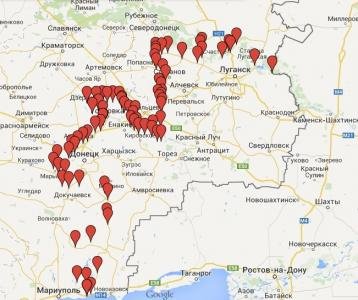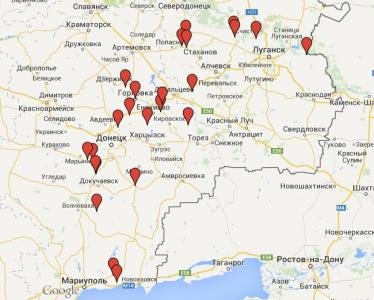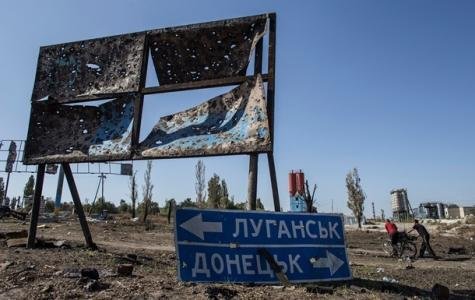 Last week the majority of Verkhovna Rada of Ukraine voted for introduction of amendments to a law on the special self-governing status in Donbass.
Last week the majority of Verkhovna Rada of Ukraine voted for introduction of amendments to a law on the special self-governing status in Donbass.
At the same time, with fierce battles reinforced by endless criticism by the “Radical Party” of Oleg Lyashko regarding “top-dressing” of the Russian aggressor with small pieces of territories, a Resolution was adopted. It defines villages, settlements, and towns in Donbass that will have the special local self-governing status.
Leaders of the so called “DNR” and “LNR” Oleksandr Zakharchenko and Igor Plotnytskyy urgently stated that Kyiv “has treaded to pieces the fragile Minsk peace” and has led the situation to the blind corner. The “DNR speaker” Andriy Purgin was troubled that Kyiv didn’t try to negotiate with the “authorities” in Donbass, as, in his opinion, it was stated in the Minsk agreements: “Actually, Ukraine has sabotaged political dialogue, that’s why the present situation isn’t rosy at all,” Purgin asserted.
Reaction of Moscow was similar. The head of the Ministry of Foreign Affairs of Russia Sergiy Lavrov called claims of the Ukrainian authorities regarding dialogue only with people that will be elected on the local elections according to the conditions set by Kyiv as nonsense. “If the Kyiv authorities achieve that, then they may not want to grant the special status to anyone,” Lavrov announced.
Oleksandra Reshmedilova, the political expert and analyst of the International informational and analytical Center “Russia-Ukraine”, explains:
“While preparing documents, they were approached as auxiliary ones. It was expected that during the next negotiations amendments and compliments would be implemented to them. These documents are so general that at any moment one part can make announcements that the opponent violated everything. It is obvious that any part will look for a more convenient argument for itself.”
A journalist of the media Pod Pricelom counted three “white spots” in the governing documents concerning the special status of Donbass. Let’s examine them.
The fist “spot“. Borders
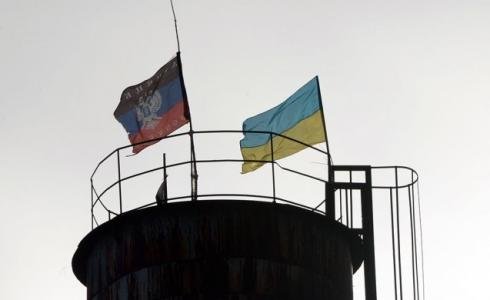 The appendix to the Resolution contains the list of territories that belong, or vice versa, do not belong to “the special status”. In total, there are 85 of them. The explanatory norm to the document says that the draft resolution is conditioned by the need of the future realization of the peaceful plan of the President, Minsk protocol of September 5 and Minsk memorandum of September 19.” So, territories that were defined by the September Minsk agreements should have gotten to the list of the special ones. They got, but not all of them. 56 settlements “do not belong to the separate districts of the Donetsk and Lugansk regions, where the special methods of self-governing is implemented”.
The appendix to the Resolution contains the list of territories that belong, or vice versa, do not belong to “the special status”. In total, there are 85 of them. The explanatory norm to the document says that the draft resolution is conditioned by the need of the future realization of the peaceful plan of the President, Minsk protocol of September 5 and Minsk memorandum of September 19.” So, territories that were defined by the September Minsk agreements should have gotten to the list of the special ones. They got, but not all of them. 56 settlements “do not belong to the separate districts of the Donetsk and Lugansk regions, where the special methods of self-governing is implemented”.
“Obviously, it is explained by the divergence of interpretation of territories, where the special self-governing should be implemented. In particular, it involves the territories that have been occupied after the first edition of the Minsk agreements entered in force. Correspondingly, the Ukrainian part emphasized that the special status requirements should be distributed exactly on these territories. At the same time, a range of settlements has been captured recently. The Verkhovna Rada didn’t distribute the status on them, although they are presently controlled by the rebels,” the associate professor of the political science department of the faculty of philosophy of the Kyiv Nation University named after Taras Schevchenko Petro Oleschchuk explained.
The expert believes that formally it is possible to consider this as a violation of the Minsk agreements by Ukrainian state.
The political expert Oleksandra Reshmedilova explains that, actually, the very Minsk agreements are a violation themselves. They infringe on the territorial integrity of the country and their implementation will lead to imbalance of the Ukrainian statehood:
“De facto, they (the Minsk agreements – Editor’s note) question sovereignty of Ukraine on its eastern territory. It is also a direct violation of the Constitution. According to the main law, Ukraine is a unitary state. Accordingly, some territories can not have a status different to other ones,” the analyst of the “Russia-Ukraine” center says. Implementation of the Minsk agreements can have only one result – slacking of the Ukrainian statehood by means of creation of a permanent center of intensity and destabilization. In addition, all Ukraine will have to deal with alimentation of the separatists formations. That’s what is important and not the borders between districts in Donbass.”
But none of experts could explain why only 29 settlements have been chosen for granting the special status. The journalist of the media Pod Pricelom looked for some information among a military expert, jurists and political analysts, but it was impossible to find any logical explanation of such “phenomenon” of territorial separation.
The second “spot”. (Un)implementation
After the draft resolution was adopted Petro Poroshenko made several statements concerning its implementation. As it is known, the document will enter in force only after local elections will be hold in Donbass in accordance with the Constitution and laws of Ukraine. However, surprisingly, the leaders of the “DNR” and “LNR” – Zakharchenko and Plotnytskyy will be able to take part in these elections.
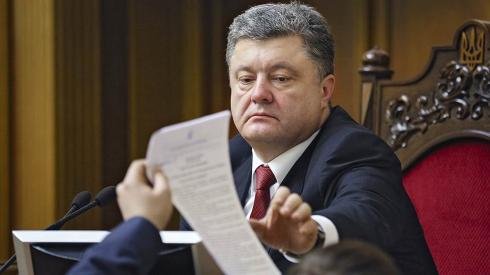 On the airwaves of the Inter TV channel the head of the state announced: “If citizens of Donetsk and Lugansk support them during the free expression of the will, it will be an absolutely different procedure. We will deal and respect any choice of Donetsk and Lugansk inhabitants. The ones chosen by the nation, but not the paraboys sent there by Russia, will take part in negotiations regarding the self-governing procedures.”
On the airwaves of the Inter TV channel the head of the state announced: “If citizens of Donetsk and Lugansk support them during the free expression of the will, it will be an absolutely different procedure. We will deal and respect any choice of Donetsk and Lugansk inhabitants. The ones chosen by the nation, but not the paraboys sent there by Russia, will take part in negotiations regarding the self-governing procedures.”
A date of holding of the extraordinary elections was set in the Article 10 of the law “On the special procedures…” but it was “exceeded”. Before voting for introductions of amendments to the law draft the deputies from the Petro Poroshenko block Oksana Prodan and Nataliya Ahafonova paid attention to that date – December 7, 2014. Ruslan Knyazevych from the very same Petro Poroshenko block explained that it was impossible to erase it, and a new date hasn’t been invented yet.
Perhaps, because of the same reason Petro Poroshenko didn’t define any time frame, in which the local elections were planned to be held. He only added that it would happen in accordance with the Minsk agreements when all armament and combatants would be withdrawn from the territory of Donbass. “Maybe, it will happen in the nearest time, maybe, in the end of the year, or maybe, even next year,” Ukrainian media quote Poroshenko.
The third “spot”. Financial one
According to laws of Ukraine and laws of logic, holding of any extraordinary or unexpected elections is financially onerous for the country. The explanatory memorandum to the draft resolution says that its implementation (i.e. holding of the local election according to all the regulations mentioned above) will not affect the income and expenses part of the State budget of Ukraine. Does it mean that the elections are going to be held on a voluntary basis?
The political expert Dmytro Kupyra explains that elections that will take place in Donbass should be only extraordinary ones, and then money will be allocated from the State budget.
“Money is needed for elections. In 2015 they are provided for the Ukraine-wide regular elections, but extraordinary ones are also financed from the state budget. We have the law No.256-VIII concerning these territories that for some reason or other expels possibility of ordinary elections in Donbass (on October 25, 2015) and requires only the special ones”.
Kupyra explains that from the financial point of view, if elections take place in 2015, the amount of money will not change:
“Only its destination is going to change (part of the money allocated for the regular elections will be transferred for the special ones). This is why if the special elections are held this year, then the money is already provided and the explanatory memorandum regarding the financial part is correct, but if they are held not in 2015 – than it is incorrect, because it is going to be a separate subvention from the budget,” the political expert concludes.
***
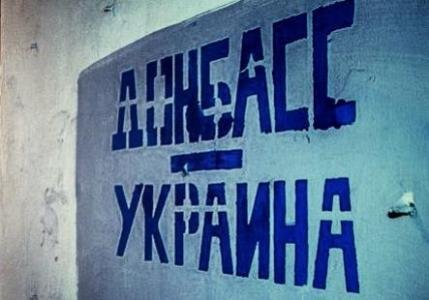 Experts share one view that the recently adopted resolution is a kind of document without any concrete features, which can be used, for example, for eye blearing. “This resolution is expedient, although it is impossible to implement it”, the manager Vladyslav Hram emphasizes. Its function is a cover: “When a hot phase begins, it will be possible to tell the world’s community: “We did everything possible for the sake of peace, but they are so bad,” Hram concludes.
Experts share one view that the recently adopted resolution is a kind of document without any concrete features, which can be used, for example, for eye blearing. “This resolution is expedient, although it is impossible to implement it”, the manager Vladyslav Hram emphasizes. Its function is a cover: “When a hot phase begins, it will be possible to tell the world’s community: “We did everything possible for the sake of peace, but they are so bad,” Hram concludes.
The politic analyst Oleksandra Reshmedilova explains that implementation of these documents can influence on the present situation in Donbass only in terms of the need of additional negotiations between the parts. “It appears that the main goal of Memorandums was to start a dialog and ceasefire process, in order to already reach the final, maybe, the third Memorandum that would consolidate final positions, including the list of settlements with the special status.”





